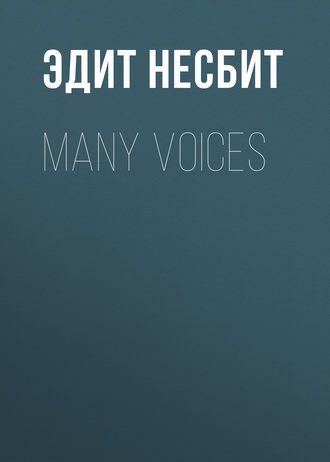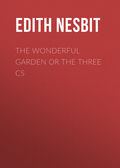полная версия

Эдит Несбит
Many Voices
THE RETURN
The grass was gray with the moonlit dew,
The stones were white as I came through;
I came down the path by the thirteen yews,
Through the blocks of shade that the moonlight hews.
And when I came to the high lych-gate
I waited awhile where the corpses wait;
Then I came down the road where the moonlight lay
Like the fallen ghost of the light of day.
The bats shrieked high in their zigzag flight,
The owls’ spread wings were quiet and white,
The wind and the poplar gave sigh for sigh,
And all about were the rustling shy
Little live creatures that love the night—
Little wild creatures timid and free.
I passed, and they were not afraid of me.
It was over the meadow and down the lane
The way to come to my house again:
Through the wood where the lovers talk,
And the ghosts, they say, get leave to walk.
I wore the clothes that we all must wear,
And no one saw me walking there,
No one saw my pale feet pass
By my garden path to my garden grass.
My garden was hung with the veil of spring—
Plum-tree and pear-tree blossoming;
It lay in the moon’s cold sheet of light
In garlands and silence, wondrous and white
As a dead bride decked for her burying.
Then I saw the face of my house
Held close in the arms of the blossomed boughs:
I leaned my face to the window bright
To feel if the heart of my house beat right.
The firelight hung it with fitful gold;
It was warm as the house of the dead is cold.
I saw the settles, the candles tall,
The black-faced presses against the wall,
Polished beechwood and shining brass,
The gleam of china, the glitter of glass,
All the little things that were home to me—
Everything as it used to be.
Then I said, “The fire of life still burns,
And I have returned whence none returns:
I will warm my hands where the fire is lit,
I will warm my heart in the heart of it!”
So I called aloud to the one within:
“Open, open, and let me in!
Let me in to the fire and the light—
It is very cold out here in the night!”
There was never a stir or an answering breath—
Only a silence as deep as death.
Then I beat on the window, and called, and cried.
No one heard me, and none replied.
The golden silence lay warm and deep,
And I wept as the dead, forgotten, weep;
And there was no one to hear or see—
To comfort me, to have pity on me.
But deep in the silence something stirred—
Something that had not seen or heard—
And two drew near to the window-pane,
Kissed in the moonlight and kissed again,
And looked, through my face, to the moon-shroud, spread
Over the garlanded garden bed;
And—“How ghostly the moonlight is!” she said.
Back through the garden, the wood, the lane,
I came to mine own place again.
I wore the garments we all must wear,
And no one saw me walking there.
No one heard my thin feet pass
Through the white of the stones and the gray of the grass,
Along the path where the moonlight hews
Slabs of shadow for thirteen yews.
In the hollow where drifted dreams lie deep
It is good to sleep: it was good to sleep:
But my bed has grown cold with the drip of the dew,
And I cannot sleep as I used to do.
FOR DOLLY
WHO DOES NOT LEARN HER LESSONS
You see the fairies dancing in the fountain,
Laughing, leaping, sparkling with the spray;
You see the gnomes, at work beneath the mountain,
Make gold and silver and diamonds every day;
You see the angels, sliding down the moonbeams,
Bring white dreams like sheaves of lilies fair;
You see the imps, scarce seen against the moonbeams,
Rise from the bonfire’s blue and liquid air.
All the enchantment, all the magic there is
Hid in trees and blossoms, to you is plain and true.
Dewdrops in lupin leaves are jewels for the fairies;
Every flower that blows is a miracle for you.
Air, earth, water, fire, spread their splendid wares for you.
Millions of magics beseech your little looks;
Every soul your winged soul meets, loves you and cares for you.
Ah! why must we clip those wings and dim those eyes with books?
Soon, soon enough the magic lights grow dimmer,
Marsh mists arise to cloud the radiant sky,
Dust of hard highways will veil the starry glimmer,
Tired hands will lay the folded magic by.
Storm winds will blow through those enchanted closes,
Fairies be crushed where weed and briar grow strong . . .
Leave her her crown of magic stars and roses,
Leave her her kingdom—she will not keep it long!
QUESTIONS
What do the roses do, mother,
Now that the summer’s done?
They lie in the bed that is hung with red
And dream about the sun.
What do the lilies do, mother,
Now that there’s no more June?
Each one lies down in her white nightgown
And dreams about the moon.
What can I dream of, mother,
With the moon and the sun away?
Of a rose unborn, of an untried thorn,
And a lily that lives a day!
THE DAISIES
In the great green park with the wooden palings—
The wooden palings so hard to climb,
There are fern and foxglove, primrose and violet,
And green things growing all the time;
And out in the open the daisies grow,
Pretty and proud in their proper places,
Millions of white-frilled daisy faces,
Millions and millions—not one or two.
And they call to the bluebells down in the wood:
“Are you out—are you in? We have been so good
All the school-time winter through,
But now it’s playtime,
The gay time, the May time;
We are out and at play. Where are you?”
In the gritty garden inside the railings,
The spiky railings all painted green,
There are neat little beds of geraniums and fuchsia
With never a happy weed between.
There’s a neat little grass plot, bald in places,
And very dusty to touch;
A respectable man comes once a week
To keep the garden weeded and swept,
To keep it as we don’t want it kept.
He cuts the grass with his mowing-machine,
And we think he cuts it too much.
But even on the lawn, all dry and gritty,
The daisies play about.
They are so brave as well as so pretty,
You cannot keep them out.
I love them, I want to let them grow,
But that respectable man says no.
He cuts off their heads with his mowing-machine
Like the French Revolution guillotine.
He sweeps up the poor little pretty faces,
The dear little white-frilled daisy faces;
Says things must be kept in their proper places
He has no frill round his ugly face—
I wish I could find his proper place!
THE TOUCHSTONE
There was a garden, very strange and fair
With all the roses summer never brings.
The snowy blossom of immortal Springs
Lighted its boughs, and I, even I, was there.
There were new heavens, and the earth was new,
And still I told my heart the dream was true.
But when the sun stood still, and Time went out
Like a blown candle—when she came to me
Under the bride-veil of the blossomed tree,
Chill through the garden blew the winds of doubt,
And when, with starry eyes, and lips too near,
She leaned to me, my heart knew what to fear.
“It is no dream,” she said. “What dream had stayed
So long? It is the blessed isle that lies
Between the tides of twin eternities.
It is our island; do not be afraid!”
Then, then at last my heart was well deceived;
I hid my eyes; I trembled and believed.
Her real presence sanctified my faith,
Her very voice my restless fears beguiled,
And it was Life that clasped me when she smiled,
But when she said “I love you!” it was Death.
That, that at least could neither be nor seem—
Oh, then, indeed, I knew it was a dream!
THE DECEMBER ROSE
Here’s a rose that blows for Chloe,
Fair as ever a rose in June was,
Now the garden’s silent, snowy,
Where the burning summer noon was.
In your garden’s summer glory
One poor corner, shelved and shady,
Told no rosy, radiant story,
Grew no rose to grace its lady.
What shuts sun out shuts out snow too;
From his nook your secret lover
Shows what slighted roses grow to
When the rose you chose is over.
THE FIRE
I was picking raspberries, my head was in the canes,
And he came behind and kissed me, and I smacked him for his pains.
Says he, “You take it easy! That ain’t the way to do!
I love you hot as fire, my girl, and you know you know it too.
So won’t you name the day?”
But I said, “That I will not.”
And I pushed him away,
Out among the raspberries all on a summer day.
And I says, “You ask in winter, if your love’s so hot,
For it’s summer now, and sunny, and my hands is full,” says I,
“With the fair by and by,
And the village dance and all;
And the turkey poults is small,
And so’s the ducks and chicks,
And the hay not yet in ricks,
And the flower-show’ll be presently and hop-picking’s to come,
And the fruiting and the harvest home,
And my new white gown to make, and the jam all to be done.
Can’t you leave a girl alone?
Your love’s too hot for me!
Can’t you leave a girl be
Till the evenings do draw in,
Till the leaves be getting thin,
Till the fires be lighted early, and the curtains drawed for tea?
That’s the time to do your courting, if you come a-courting me!”
And he took it as I said it, an’ not as it was meant.
And he went.
The hay was stacked, the fruit was picked, the hops were dry and brown,
And everything was garnered, and the year turned upside down,
And the winter it come on, and the fires were early lit,
And he’d never come anigh again, and all my life was sick.
And I was cold alone, with nought to do but sit
With my hands in my black lap, and hear the clock tick.
For father, he lay dead
With the candles at his head,
And his coffin was that black I could see it through the wall;
And I’d sent them all away,
Though they’d offered for to stay.
I wanted to be cold alone, and learn to bear it all.
Then I heard him. I’d a-known it for his footstep just as plain
If he’d brought his regiment with him up the rutty frozen lane.
And I hadn’t drawed the curtains, and I see him through the pane;
And I jumped up in my blacks and I threw the door back wide.
Says I, “You come inside;
For it’s cold outside for you,
And it’s cold here too;
And I haven’t no more pride—
It’s too cold for that,” I cried.
Then I saw in his face
The fear of death, and desire.
And oh, I took and kissed him again and again,
And I clipped him close and all,
In the winter, in the dusk, in the quiet house-place,
With the coffin lying black and full the other side the wall;
And “You warm my heart,” I told him, “if there’s any fire in men!”
And he got his two arms round me, and I felt the fire then.
And I warmed my heart at the fire.







